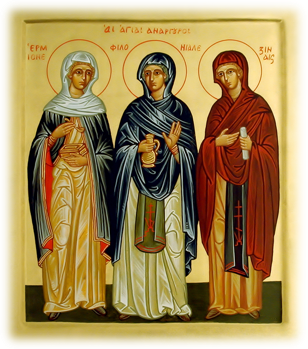Saints of the Week: Zenaida, Philonella, & Hermione
4/16/2025

Zenaida, Philonella, & Hermione
(1st Century A.D.)
Zenaida and Philonella of Tarsus were the first Christian physicians after Luke the Evangelist and the first "unmercenary" doctors (those who charged no fees to patients) of whom we know. They are particularly venerated in Eastern Christianity. The sisters were born into a well-educated Jewish family and were allegedly Apostle Paul’s cousins. Educated in philosophy and medicine at an academy in Tarsus, they specialized in medical arts. After “graduating,” they relocated to Mount Pelion near Demetriada, Thessaly, known for its healing springs and shrines to Aesculepius, Greek god of medicine. Physicians who practiced there catered to the wealthy, charging exorbitant fees for services, and augmented their incomes by selling magical amulets and charms. The sisters opposed the prevailing custom. Locating a cave with a mineral spring, they set up a chapel, living quarters, and opened a clinic, treating all who needed care regardless of their ability to pay. Philonella specialized in experimental medical methods that resembled modern scientific practice and worked hard to separate effective techniques from superstition. Zenaida’s specialty was pediatrics. Both sisters devoted their lives to prayer when they weren’t working in the clinic. Traditions vary about their deaths. One account suggests they were stoned to death by pagans on the same night. Another says they met peaceful ends, with Philonella surviving her sister by a few years, deepening spiritual devotion and becoming known as a wonderworker.
Hermione, born in Caesarea, Palestine in the early 1st century, was Philip the Deacon’s daughter. Inspired by a true understanding of the gospel, she studied medical arts and philosophy. She bought a house, founded a medical clinic, and devoted her talents to treating the poor and the homeless. With her sister Eukhidia, the two added rooms for homeless patients and poor travelers who were ill, establishing the first xenodukia (hospital-hostel) which would become integral to Orthodox Christian tradition. While treating physical illnesses of those who came to her, she also nourished them with the gospel. During the reign of Emperor Hadrian, she was arrested. Despite her old age she was subjected to gruesome tortures to force her to renounce her faith. Enduring them all, she was eventually beheaded in Ephesus.



